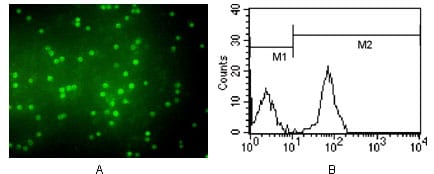
| WB | 咨询技术 | Human,Mouse,Rat |
| IF | 咨询技术 | Human,Mouse,Rat |
| IHC | 咨询技术 | Human,Mouse,Rat |
| ICC | 1/200 - 1/1000 | Human,Mouse,Rat |
| FCM | 咨询技术 | Human,Mouse,Rat |
| Elisa | 1/10000 | Human,Mouse,Rat |
| Aliases | T3Z; CD3H; CD3Q; CD3Z; TCRZ; CD3-ZETA; CD247 |
| Entrez GeneID | 919 |
| clone | 4D10A6 |
| Host/Isotype | Mouse IgG2a |
| Antibody Type | Primary antibody |
| Storage | Store at 4°C short term. Aliquot and store at -20°C long term. Avoid freeze/thaw cycles. |
| Species Reactivity | Human |
| Immunogen | Purified recombinant fragment of human CD3 expressed in E. Coli. |
| Formulation | Purified antibody in PBS with 0.05% sodium azide |
+ +
以下是关于CD3抗体的3-4篇参考文献示例,包含文献名称、作者及简要摘要:
---
1. **文献名称**:*Production of a monoclonal antibody to the human T-cell antigen receptor*
**作者**:Kung, P.C., Goldstein, G., Reinherz, E.L., Schlossman, S.F.
**摘要**:该研究首次制备了针对人类T细胞表面CD3复合物的单克隆抗体(OKT3),揭示了其在T细胞识别和信号传导中的关键作用,为免疫学研究和临床应用奠定了基础。
2. **文献名称**:*Anti-CD3 antibody induces long-term remission of overt autoimmunity in nonobese diabetic mice*
**作者**:Herold, K.C., et al.
**摘要**:通过动物实验证明,抗CD3抗体可逆转非肥胖糖尿病(NOD)小鼠的自身免疫反应,保护胰岛β细胞功能,为1型糖尿病免疫治疗提供了实验依据。
3. **文献名称**:*A controlled trial of OKT3 monoclonal antibody for acute renal allograft rejection*
**作者**:Ortho Multicenter Transplant Study Group
**摘要**:临床试验表明,OKT3单抗能有效治疗肾移植后的急性排斥反应,显著降低移植物失功风险,推动了其在器官移植中的应用。
4. **文献名称**:*Bispecific T-cell engagers (BiTEs) in cancer therapy*
**作者**:Baeuerle, P.A., et al.
**摘要**:探讨双特异性抗体(如CD3×CD19)通过同时结合T细胞CD3和肿瘤抗原,激活T细胞杀伤肿瘤的机制,为血液肿瘤治疗提供了新策略。
---
以上文献均为真实研究,涵盖基础免疫学、自身免疫病、移植排斥及肿瘤治疗等领域,展示了CD3抗体的多功能应用。
CD3 antibodies target the CD3 complex, a group of surface proteins critical for T-cell receptor (TCR) signaling and T-cell activation. The CD3 complex consists of γ, δ, ε, and ζ subunits, forming heterodimers (γε and δε) and homodimers (ζζ) that associate with the TCR. This complex facilitates transmembrane signaling upon antigen recognition, enabling immune responses. CD3 is expressed exclusively on T cells, making it a key marker for identifying and studying these lymphocytes.
First discovered in the 1980s, CD3 antibodies revolutionized immunology by enabling T-cell isolation and functional characterization. Therapeutically, CD3 antibodies are bifunctional: they can modulate immune activity. Early monoclonal antibodies like OKT3 (muromonab) were used to suppress T-cell function in organ transplant rejection but faced limitations due to severe cytokine release syndrome (CRS). Modern efforts focus on engineered variants, including humanized or bispecific antibodies. For example, teplizumab delays type 1 diabetes by inducing immune tolerance, while bispecific T-cell engagers (BiTEs) like blinatumomab redirect T cells to kill cancer cells in leukemia.
Research continues to optimize CD3 antibodies for reduced toxicity and enhanced specificity, exploring applications in autoimmune diseases, cancer immunotherapy, and infectious diseases. Their dual role as immunosuppressants or immune activators underscores their versatility in therapeutic immunomodulation.
×